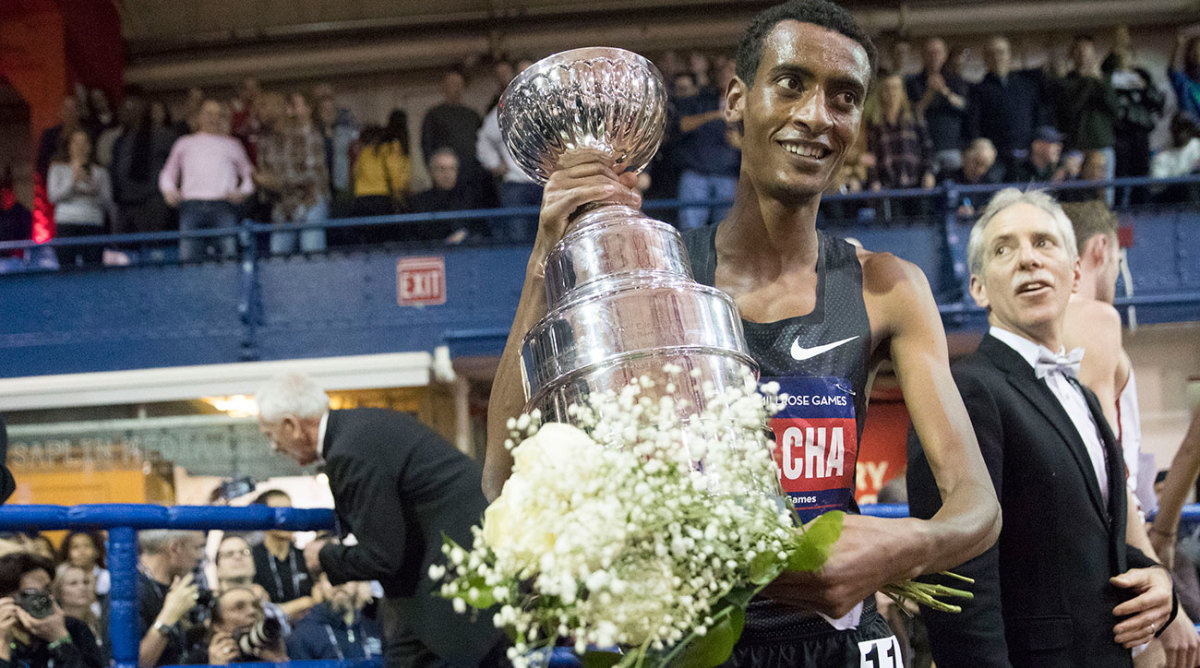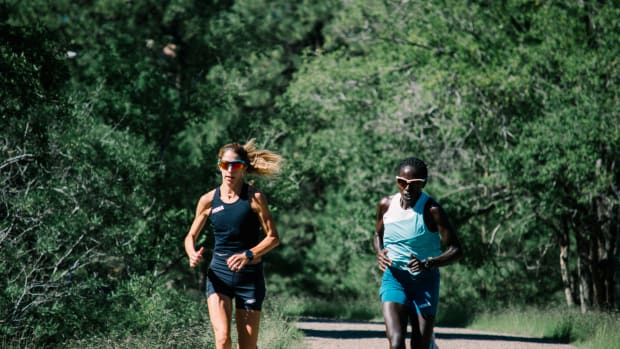Breaking Down Yomif Kejelcha's 3:48:46 Mile, World Record Attempt

On Saturday afternoon at the Millrose Games in New York City, Ethiopia's Yomif Kejelcha fell just .0008 seconds shy of breaking Hicham El Guerrouj's indoor mile world record but still won the men's Wanamaker Mile in 3:48.46.
The world record of 3:48.45 by El Guerrouj was set in 1997 in Ghent, Belgium.
Pacer Rob Napolitano and Kejelcha went through the first 400 meters in 56 seconds, which Kejelcha later described as "too fast." Napolitano was slated to take the field through the first 1,000 meters but Kejelcha made the pass before 800 meters because he felt that Napolitano was starting to slow down.
Kejelcha took off and gapped a stacked field that included Edward Cheserek, who ran 3:49.44 for the mile in 2018, and U.S. Olympic bronze medalist Clayton Murphy.
Kejelcha ran a 28.33 for the final 200 meters and crossed the finish line nearly five seconds ahead of Cheserek and Murphy. Kejelcha appeared elated by the time and then quickly disappointed when the clock said he was just a hundredth of a second off the fastest time in history.
Kejelcha told reporters that he is planning on attempting the world record again and is confident that he can break it. A possible attempt could be scheduled at Boston University's indoor track facility.
You can watch the final lap of the race below:
Shortly after the race, U.S. Olympian Bernard Lagat was standing alongside the track. Lagat remains the American record holder with his 3:49.89 set in Fayetteville, Ark. in 2005. He shared some of his immediate thoughts from that performance.
Sports Illustrated: What stood out to you about that performance?
Bernard Lagat: I think the most impressive part of that performance is how he was able to maintain the pace. He just kept pushing. The most important part of the whole race was that he had to pass the pace setter [Rob Napolitano] earlier than expected and he did it early enough. You never know when someone is going to be slowing down. He was able to recognize that and avoid himself from also slowing down. Kejelcha made the decision to pass him early and that was the right decision to do. He didn't look back. He kept his stride going the same way. He ran that almost evenly and that's why he was able to get so close to the world record.
SI: Before the race, we were talking about how important the start is in a race like this. You used to race El Guerrouj and you were explaining to me how you'd get out for the beginning of the race.
BL: The most important part about about the beginning is not having to create a gap between yourself and the pace setter or if you're following a guy who is following the pacer, you don't want a gap to form between you and them. There was nothing like that in this race. When Kejelcha took off today, he was right in front and the pacer was able to line up and get ahead of him.
SI: The assignment for the pacer was to run 2:20 to 2:22 through the first 1,000 meters of the race. What is the best approach to tackling the first portion of the world record?
BL: For me, I believe that anything between 2:20 and 2:21. Kejelcha was in that range so there's not much more that he could have done. I wish he was able to shed off that .01 second. He'll be hungry to come back. I think he knows that he can reach it so it's just a matter of determining how to attack it next time.
SI:How do you feel about dropping down on the all-time list?
BL: (Jokingly sighs) It's OK. Time will eventually move us. Hicham El Guerrouj is still on top. Edward Cheserek moves down to third. Eamonn Coghlan and myself are there in the top five. One thing that I know for a fact and that will never change is that I will always be a sub-3:50 guy.





